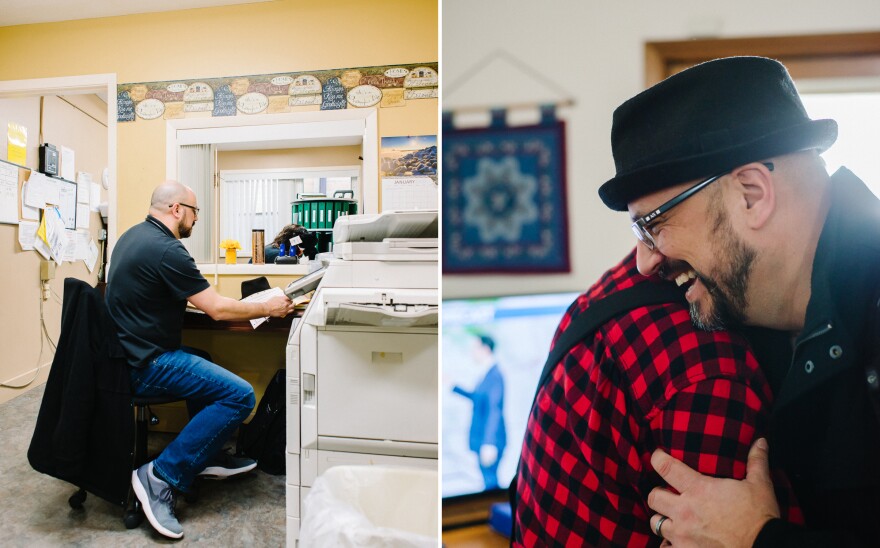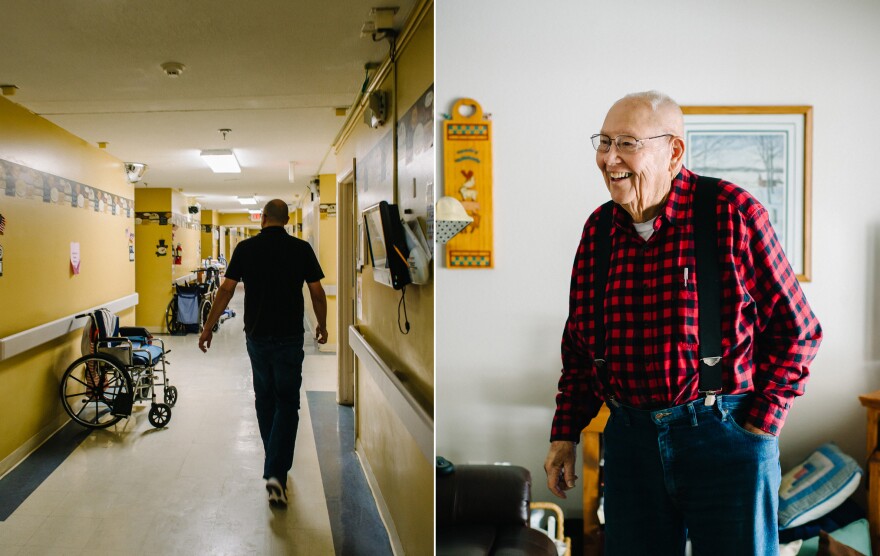Glenn Hurst didn't grow up dreaming of becoming a doctor. But eventually, he made his way into health care, taking a job placing doctors in small towns. Traveling farm country, he says, the work moved him in ways he didn't expect.
"To see the physicians in those communities helping those people stay in their fields, helping those people's families be safe ... I decided that I wanted to be part of something rural and I wanted to be part of health care," he says.
These days, Hurst is a doctor and runs a rural health clinic in tiny Minden, Iowa, population about 600. It's work where he sees hardship firsthand. He talks about farmers who sew themselves up with fish wire just so they don't lose hours of work during harvest. The closest hospital is about 30 minutes away.

Then there are his own struggles at the clinic. He says that ever since Iowa privatized Medicaid in 2016, he's seen many legitimate Medicaid claims denied by private insurance companies. As a result, he's found himself treating some patients knowing he won't get paid. He's taken out $15,000 in loans to keep his clinic open and worries he won't make payroll for his employees.
"Every second Friday I worry about that," he says.
Health care has consistently polled as the No. 1 issue voters care about in Iowa. With Monday's caucuses less than 72 hours away, decision time is rapidly approaching for voters like Hurst who are not just weighing which candidate to back, but what health care should look like in the future.
Much of the debate in Iowa has centered around the Republican push to privatize Medicaid, the state-federal program that helps provide health care coverage for the poor. Privatization was passed in 2016 by the state's then-governor, Republican Terry Branstad, on a promise that it would save taxpayers money.
But across the state, there's disagreement over whether privatization has worked. Hospitals, nursing homes and other providers caring for the state's more than 615,000 Medicaid patients say denials and delays have left them strapped.
More changes could be on the way. On Thursday, the Trump administration announced a plan that would allow states to place caps on Medicaid spending.

Even before the announcement, there have been fears across Iowa that rural hospitals' dire financial situations could cause them to close. One recent analysis found that nearly 18% of rural hospitals in Iowa are at a high risk of closing unless their financial situations improve.
The candidates and their plans
A CNN poll earlier this month shows that among the solutions offered by Democratic candidates, 24% of likely Iowa caucusgoers say that Vermont Sen. Bernie Sanders has the policy position that aligns most closely with their own. Former Vice President Joe Biden polled second on the question, with 16%, followed by former South Bend, Ind., Mayor Pete Buttigieg at 15% and Massachusetts. Sen. Elizabeth Warren at 14%. Together, Biden, Buttigieg, Sanders and Warren comprise the top tier of four candidates in Iowa.
Sanders and Warren support "Medicare for All," a national health insurance program where coverage is provided to everyone and private health insurance would mostly go away. Biden and Buttigieg support a system that incorporates government-provided insurance coverage that the public can choose to buy into if they are unhappy with their private plan.
Hurst, himself a local Democratic party chair, supports a single-payer, Medicare for All model. He says he would prefer a president like Sanders or Warren, but that he could also back a more moderate candidate who didn't support total overhaul.
"We will not achieve perfection," he says. "Our goal will always be to strive for improvement. ... It is perfectly OK to accept and support somebody who is willing to make progress towards that perfection."
For voters like Pat Coffman, the choice could come down to affordability. Coffman, who serves as the activities director at a nursing home in Council Bluffs, says she hashealth insurance but struggles to afford it.
"I'm one of the underinsured," she says. "I have insurance through my job. But the deductible is $6,600."
Coffman has a chronic illness and is supposed to see a gastro specialist regularly but doesn't because of the cost. She's been taking out loans to try to get there. Then, last summer, she suffered injuries after falling down the stairs.
"I broke my nose in three places. I had a terrible concussion — 75 stitches," she says. The final bill was about $30,000, most of which she says insurance covered. But she still owed $6,000, in addition to the loans she was still paying off. She feels like it's just too much.
She plans to back Sanders on Monday.
Copyright 2021 NPR. To see more, visit https://www.npr.org. 9(MDEwMTk5OTQ0MDEzNDkxMDYyMDQ2MjdiMw004))









